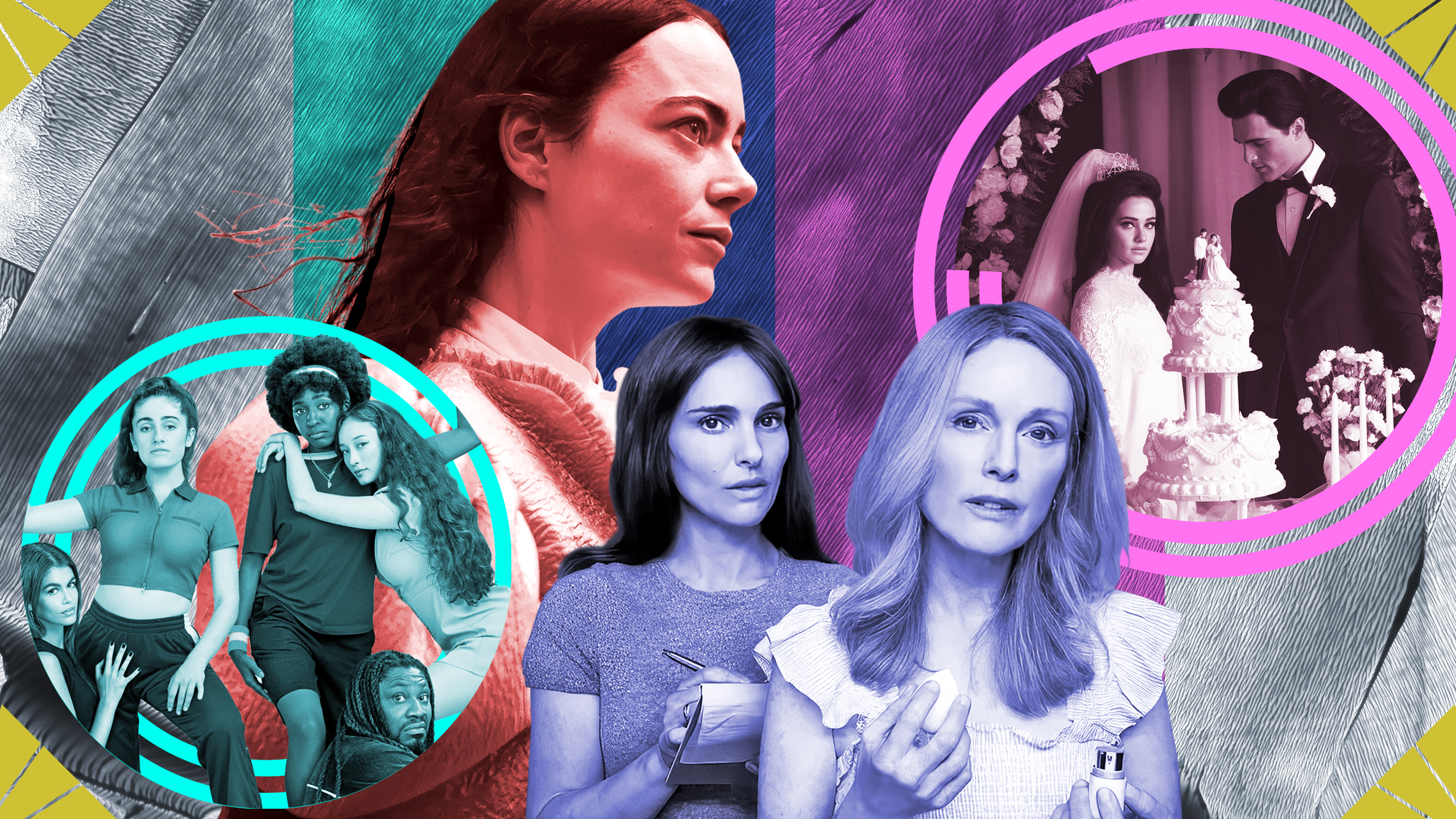2023 was a year full of wildly inventive original screenplays and bold adaptations from dependable favorite filmmakers and young voices alike. 2023 was also the year that screenplays earnestly began to be adapted from marketing decks beyond the reasonable exceptions of toys like Legos, tech villains like Facebook, and horrible little freaks like the Garbage Pail Kids. While in some cases this development has permitted some of the biggest blockbusters of the year to address radically feminist concepts and heavy subject matter like generational depression (shoutout Barbie, who barely missed the cut on this list), in others, we now have a movie about inventing Cheetos. I assume.
But after things looked dicey midway through the year, the past few months have brought banger after banger to theaters (and, less so than in recent years, straight to streaming), making the task of narrowing our list down to 10 titles more and more difficult with every ticket purchased. It’s not the worst problem we could have. After all, the trailer for Seinfeld’s Pop-Tarts movie could drop any day now.
Here are our picks for the 10 best movies of 2023.
10. BlackBerry
BlackBerry couldn’t have landed at a worse time. Realistically, I imagine Matt Johnson’s breakthrough to the mainstream (or at least newfound access to a budget granting him third billing rather than a starring role) was only made possible due to the nauseating sponcon-aissance presently being carried out in Hollywood into which the film was unceremoniously lumped. Yet in telling the deeply personal narrative of how one such product failed, Johnson is already dissecting the unfortunately emerging subgenre to carefully strip it of its capitalist roots and expose the ways in which this system ultimately spoils what matters most to us on both a personal and professional level.
In telling the story of an unraveling friendship and a paralleling abandonment of passionately grounded business ethics, BlackBerry also serves as a fascinating experiment in genre that mirrors Johnson’s own professional career. After opening with the feel of a quirky low-budget mumblecore indie (a realm the director knows well), the increasing presence of corporate figures commandeers the aesthetic to the point that it ultimately shifts entirely into an earnest blockbuster tech biopic in the vein of Steve Jobs or The Social Network, evidently expressing Johnson’s empathy with his main character. In the end the biggest difference between the two is that Johnson didn’t wind up ironically recreating the final scene of his favorite movie with a deeply shitty product in place of priceless historical artifacts. — Mike LeSuer
9. Saint Omer
Like many filmmakers who straddle the lines of documentary and narrative filmmaking, Alice Diop possesses an immense tact in how she wields perspective and its capacity for empathy. Arriving after a number of documentaries and shorts, her narrative feature debut Saint Omer—following pregnant novelist Rama as she witnesses the trial of Senegal-born Laurence Coly who stands accused of infanticide—achieves a deft balance without ever tipping over into melodrama or exploitation of audience sympathies. Diop is a marvel with subtle reversals and subversions, carefully eroding the film’s visual language to take our viewership on a similar progression to Rama’s arc, breaking down the walls of objectivity and emotional distance as the film plays out.
Over the course of the trial’s three days, Diop shifts from a relatively distant survey of the proceedings to closer, more intimate shots of Coly and Rama as the film breaks down their supposed separation, culminating in a shattering direct glance between the two, made directly into the camera. As Rama’s literal viewpoint of Coly changes, Diop illustrates the intricacies of the latter’s life in the intersections of motherhood and being Othered that are misunderstood by all in the courtroom but Rama. In doing so, Diop shows a powerful recognition of our ability to see ourselves in total strangers—and in those who seemingly commit unspeakable acts—and our unconscious empathization with lives that could easily have been our own. Like the film’s own visual evolution, Saint Omer shakes you to your core—a quiet powerhouse that lingers long afterwards. — Natalie Marlin
8. The Zone of Interest
Jonathan Glazer’s cinematic adaptation of Martin Amis’ 2014 novel The Zone of Interest obfuscates conventional cinema with its haunting portrayal of the Holocaust. Christian Friedel (The White Ribbon) portrays Rudolf Höss, the longest-serving commandant of Auschwitz, delivering a performance marked by chilling normalcy. In interviews, Friedel explains that this depiction was a deliberate choice, aiming to present these historical figures as human, despite their heinous actions. Scenes that might have depicted Höss in a more overtly evil light were omitted, focusing instead on the everyday life of his family. The film’s unique approach is further accentuated by Łukasz Żal’s cinematography and Mica Levi’s score. Żal’s work links domestic scenes causally to the exterior horrors through sound, establishing a stark contrast between the Höss family’s life and the atrocities of Auschwitz.
The Zone of Interest stands out for its exploration of the banality of evil, presenting a narrative that challenges viewers to reflect on its nature and the role that individuals play in perpetuating historical atrocities. These choices by Glazer, along with the nuanced performances, meticulous cinematography, evocative score, and other technical aspects of the film, combine to create a thought-provoking cinematic experience that stands out for its subtle yet profound storytelling. It’s a film that doesn’t just recount history, but prompts a deeper reflection on human nature and morality. — Patrick Devitt
7. Talk to Me
Co-directors Danny and Michael Philippou arrest the senses with neck-cracking brutality and a story so disturbing that you’ll never sleep the same way again. A meditation on grief, Talk to Me gives Sophie Wilde’s Mia a stage on which to navigate her mother’s tragic death and learn that there’s real value in experiencing pain, no matter the cost. The film tells a deeply personal story about what it means to feel alive and the avenues we, as human beings, often take to feel something—anything—in the face of catastrophe. As Mia reels from her loss, she meets up with a group of friends who spend their free time playing games with an embalmed hand. Things start innocently enough, but it quickly turns into a devilish game of hide-the-soul.
When one grasps the hand, they utter the film’s titular words, and as an entity appears before them they must “invite” the being into themselves, resulting in a violent possession. The person then begins to move about, their bones flailing and snapping, and even speaking like the unknown figure. More tragedy befalls the group, and it’s up to Mia to stop it from spreading. Apart from incisively dissecting the grieving process, Talk to Me is as much about accountability, demonstrated through Mia’s misery and how it impacts those around her. She so desperately wants to reconnect with her dead mother that she fails to save those who are still alive. From fantastic creature designs to an insane finale, Talk to Me lingers with you long after the credits have rolled. — Bee Delores
6. Bottoms
At their aggressively patriarchal high school, two unpopular lesbian best friends (Rachel Sennott and Ayo Edebiri) start a female fight club to get closer to their crushes, shaking up the social order in the name of feminism for entirely selfish reasons. All the bawdy comedies want what Bottoms has: a steadily escalating series of ridiculous culminating in an all-out orgy of violence. Other not-to-be-named 2023 comedies valiantly tried and nobly failed to pull off this trick. It touches on, but neither parodies nor homages, teen movies of the past, simply existing in its own universe parallel to the others, where time is squishy (I spotted a flip phone?) and pop culture is a grab bag (the audience at my screening went wild for the “Complicated” needle drop).
Sennott and Edebiri are both superstars in the making—if not already made—but don’t sleep on standout performances from Ruby Cruz and the ridiculously game Nicholas Galitzine. And Marshawn Lynch, who I guess is a football player (clever casting for a movie about screwing over the football team). It’s arguably the funniest movie of the year, and in my opinion more successful than Sennott and writer-director Emma Seligman’s breakout collaboration, Shiva Baby, which was smart and sly but still bore the stretch marks of having been originally conceived as a short. Bottoms could only be a feature. Thank god! A perfect double bill with Bodies Bodies Bodies or (depending on how it turns out) the new Mean Girls. — Lizzie Logan
5. Sick of Myself
With Joachim Trier, Thomas Vinterberg, and Ruben Östlund all achieving Oscar recognition over the past couple years, there’s a new visibility for Scandinavian cinema here in the States that seems determined to supersede the region’s associations with Bergman, Dreyer, and paint-dry/abyss-gazing cinema—well, at least to add a bit of comedy to that legacy. As if specifically targeting American audiences, Kristoffer Borgli’s work in social-satirical screenwriting not only inspired an overdue S-tier Nic Cage role with this fall’s Dream Scenario, but it can be hard for American viewers to process his prior film from this year, the Norwegian Sick of Myself, as anything but a cautionary tale about what living in a country with free healthcare could drive you to do.
Over the course of the film, Borgli manages to out-Östlund his peers at nearly every turn as he riffs on the ludicrous appeal of contemporary interior design and the fashion world’s selective inclusivity (to say nothing of the ever-lingering anxiety of legal culpability). The narrative basically recreates Cronenberg’s take on The Fly for our contemporary age of narcissism, where it’s less an obsession with one’s career that eclipses a relationship and more an obsession with casually lying that fuels the tug-of-war battle for attention that oddly parallels certain high-profile celebrity relationships as one faction, say, purchases a mainstream social media channel while the other uses that very channel to crowdsource recommendations for permanently reshaping her face.
In the end Sick of Myself presents a gruesome and graphically literal analogy for self-victimization through the type of car-wreck-you-can’t-look-away-from romantic partnering we’ve all had the misfortune of encountering. And what better way of translating abject self-loathing to an audience than through stomach-churning body horror? — Mike LeSuer
4. The Boy and the Heron
A wizened man informs the protagonist of The Boy and the Heron that only 13 blocks manage to hold up a magical world within a crumbling tower before asking the 12-year-old Mahito to create a new world. Those blocks can be viewed as a nod to Hayao Miyazaki’s magnificent cinematic vision, spanning a dozen imaginative films dating back to 1979’s Lupin the Third: The Castle of Cagliostro. The celebrated Japanese director exited retirement again to give us this alternate-universe fantasy about a young preteen grappling with his mother’s death during World War II.
Loosely based on Miyazaki’s life and a wooly reading of his childhood favorite book How Do You Live?, The Boy and the Heron brings to life a talking gray heron, a parrot troop, a girl who can travel through fire, and adorable marshmallow spirits to dazzling effect. The story is more of a meditation on grief, artistic legacy, and destruction and creation within our lives in lieu of a defined set of morals pulled by a clear narrative cord.
The Boy and the Heron is also a visually striking homage to the 82-year-old filmmaker’s impressive body of work with perceptible references to classics such as Princess Mononoke, My Neighbor Totoro, Spirited Away, and deeper cuts like his post-apocalyptic adventure anime series Future Boy Conan from 1978. Miyazaki fans will no doubt argue whether this film is his magnum opus, but it unquestionably adds a new block on top of an already towering achievement in animation and cinematic wonder. — Kyle Lemmon
3. Poor Things
When is a Frankenstein story not exactly a Frankenstein story? When it’s director/social satirist Yorgos Lanthimos and devilishly unconventional screenwriter Tony McNamara—known together for their work on 2018’s The Favourite—making light of two of the 21st century’s most already-upended topics, gender and patriarchy, in a bizarre, hyper-sexualized, human-scale monster comedy starring Willem Dafoe as a mad (as in angry) scientist and Emma Stone as his reanimated heroine with comedians-turned-actors Ramy Youssef and Jerrod Carmichael along for the ride.
Filled with mental and sexual breakdowns, violently uncomfortable sadism, and extracted goat brains, the comedy of Poor Things never comes easy. And though it’s unfair to focus on one actor’s brave performance when everyone (including Mark Ruffalo) at Poor Things Central is working to the heights of their theatrical prowess, credit must be given to Stone. Already at her subtlest, mean, cringe-comic best this year in Nathan Fielder’s The Curse, Stone adds the elements of menace, wonder, and free jazz to her portrayal of a freshly created child in a woman’s body where all she surveys is of savage delight—McNamara’s script and Lanthimos’ direction included.
By Poor Things’s close, you’ll experience the sensation of having laughed at something so clownishly off-kilter, you’ll feel bad about yourself. Don’t let that stop you, however, from seeing Poor Things more than once—there’s something new and bold with each viewing. — A.D. Amorosi
2. May December
Known for films like Far From Heaven and Carol, director Todd Haynes’ latest feature revisits the aesthetic of 1950s melodrama with a complex blend of psychological horror, humor, and scandalous drama that unearths rich emotion from all of its actors. May December’s narrative centers on a couple (portrayed by Julianne Moore and Charles Melton) whose life becomes complicated with the arrival of Elizabeth (Natalie Portman), an actress investigating their infamous tabloid history. Tasked with playing Moore’s Gracie in an upcoming film, Elizabeth finds herself entangled in their past, leading to unforeseen revelations as she seeks deeper understanding for her role.
The film’s exploration of the characters’ intricate dynamics brings to light the complexities of fame and identity in everyday human relationships. Haynes masterfully captures the tension between past and present, as the characters grapple with the consequences of their earlier choices under the scrutinizing gaze of the media and public opinion. Portman’s portrayal of Elizabeth, as she immerses herself in Gracie’s persona, raises intriguing questions about the essence of acting and the blurred lines between reality and performance. This is not just a story about a scandalous romance; it’s a deep dive into the human psyche, challenging the audience to consider the multifaceted nature of truth and perception in a world where public and private lives intersect dramatically.
Ultimately, May December showcases Haynes’ ability to craft cinema that entertains and stimulates contemplation, inviting audiences to ponder the complex interplay of emotions, public image, and personal truth. — Patrick Devitt
1. Priscilla
No one does Sad Girl–core like Sofia Coppola—is that so wrong? If other directors can explore the nuances of mafia life or World War II over the course of multiple films, Coppola can play with melancholy, privileged white girls as many times as she can find something new to say about them.
Femininity is a golden cage, and this time, it’s a cage shaped like Graceland, where Priscilla Beaulieu moved as a teen to be looked after by no one and watched by everyone while Elvis groomed her as a playmate and doll. The movie is specifically about The Elvis Years, beginning the moment the 14-year-old met the man who would introduce her to Elvis, and ending the day she left the King for good. Coppola carefully avoids passing judgment on the central relationship, which is by turns violent, passionate, loving, and stifling. The performances are steady rather than showy impressions, and of course the sets and costumes are exquisite.
Because it has to be said, yep, it’s a more satisfying study of its title character than Baz Luhrmann’s was of his. 2022’s Elvis was a rollicking good time that felt like a circus with Colonel Tom Parker as its ringleader—exciting, but spectacle as much as story. Priscilla the movie is subtle, and Priscilla the woman is not the outwardly defiant, spunky, or resilient heroine some might have wanted to see escape from the clutches of the big, bad superstar. Coppola’s work is often accused of skating on the surface of things, but in this case, a little empathy goes a long way toward understanding Priscilla’s state of mind.
As her world becomes more and more about Elvis, she hides what’s left of her own identity away, making it smaller, burying it deeper. She puts up with his worst tendencies not because her self-esteem is so low—though maybe it is—but because she’s detached from the idea of what she thought their life together would be. Confronting him about his cheating didn’t work, so she decides not to care. Yes, she’s accepting defeat, but she’s also robbing her husband of the ability to hurt her in that way. She just lets it go. Priscilla takes whatever love Elvis gives, basks in the sun of his attention when it’s available, ignores the ways he’s volatile, and carves out, little by little, an inner world of her own. No, she can’t flourish during their marriage, she can’t find any lasting happiness. But the fact that she didn’t go completely off the deep end under those circumstances is pretty damn impressive. Beneath the bows, it’s just possible that Priscilla is one tough cookie.
As Elvis withdraws into drugs, she finally gives herself permission to leave him. He doesn’t need her any more, and so, as Dolly sings that she will always love him, away she goes. At the risk of reducing a serious work of filmmaking to a throwaway meme, let me say, the girls who get it, get it. — Lizzie Logan









